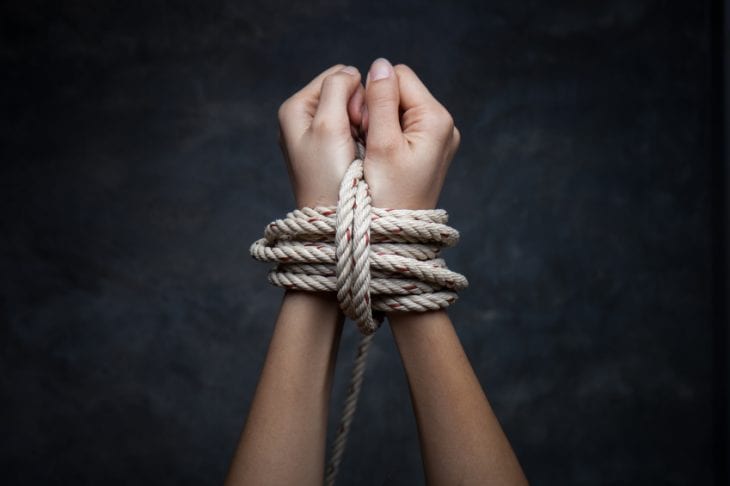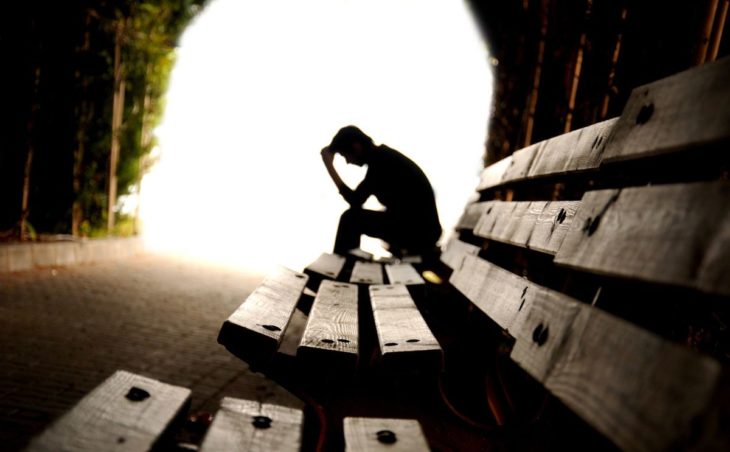A note: There’s a lot of trigger-y, very heavy material in this particular essay, including descriptions of graphic fictional violence (in nightmares) and mentions of sexual violence. I included it to paint as clear a picture I could of what it feels like to have Post-Traumatic Stress Disorder. All respect is given to those who wish not to read that sort of thing: You take care of yourself however you need to.
“Wild,” the film adaptation of Cheryl Strayed’s memoir, came out this weekend and I know I’ll see it eventually, but it’ll probably be with a pretty heavy heart. I never read the book, either, although I read Tiny Beautiful Things and loved it.
I could just about write a eulogy for 2014 that wasn’t. In February, I started making plans to quit my job and travel by plane, bike, train, and bus all across the United States. It didn’t work out. Right now, I was supposed to be in Florida visiting an old friend and her baby and trying not to get eaten by alligators.
That was all for the best, as long as “the best” is held to a moderate standard. I’m glad I got to spend my year with my lovely boyfriend and work on our relationship. I’m glad I got a therapist. I’m glad I got off of medications that were doing more harm than good. I’m glad I started writing and ultimately got a full-time job doing it. I’m glad I live in a nice new apartment and have a pretty good idea of what my boundaries are and how to keep myself healthy. That is a textbook definition of “a good life.”
But I still wonder about what I wrote this summer, about how for some people, seizing the day doesn’t mean traveling around and seeing the world and meeting all sorts of interesting people. I said, “Maybe not everyone is missing out if they don’t pursue it.” That’s a reasonable statement to make, but I still wonder if I really feel like I am not missing out.

Source: ptsdjournal.com
It bothers me. I imagine myself as someone who’s able to endure a lot, and I have endured a lot. Physical pain is not a problem for me. Intellectual patience is one of my stronger points. But it’s my emotional capacity that broke down when I tried to stake out on my own: There were too many strangers, too many variables, not enough assurances, not enough money; I panicked, I froze up, and I quit. A little part of my brain has been berating myself for it ever since: I wasn’t strong enough, I didn’t plan well enough, and I lost out on a good opportunity that might never come my way again.
If I said “it’s because of my PTSD” it would be factual but a gross oversimplification, if only because when I reference “my PTSD,” I have to live with the fact that I know what exactly happened to get me to that diagnosis, but disclosing that to a wider audience would be painful, tedious, and probably inappropriate. To keep saying “my ex-husband was abusive” is reductive, but to disclose a litany of instances of abusive behavior over the course of seven years would be painful, tedious, and probably inappropriate.
It was because of my PTSD that I broke down emotionally when I tried to cope with traveling without a safety net, and I do have PTSD because of abuse at the hands of my ex-husband as well as rape. But maybe the better way to talk about it would be to talk about the way that PTSD feels, what happens. Today, I’ll try doing that in the form of talking about my nightmares.
There have been five since I got back from Portland. In the first, I woke up and was in New York. I didn’t feel like I was in New York — I was convinced that I was actually awake and had somehow gotten to New York. Everything I saw except my own hand was cloudy and grey, but I could hear the sounds of New York City pouring into the room from a cracked window. I thought I was with my sister, in an apartment she’d had to rent after she moved away from Chicago, but was actually just someone’s very small attic with a mattress. I panicked because I couldn’t see, and I didn’t know how or when I had gotten to New York. I thought maybe I had somehow forgotten that I had traveled there. My sister kept asking me if I was all right, but I couldn’t make out her face. I wanted to talk to my boyfriend, Michael, so badly — and then it occurred to me that I might be dreaming, so I asked where he was over and over, and she didn’t answer. I tried to wake myself up and couldn’t. I told myself to feel for my bed frame, and when I felt the raw lumber of my bed frame from my apartment in Chicago, I snapped into reality, calling out for Michael. It was displacing to switch so immediately from place to place and not know which one was real.

Source: Buckfire & Buckfire, PC
My second nightmare was long and no one would actually want to hear the story because it was tedious. Suffice a summary that goes something like: I was running errands with my mom. She parked the car and went off somewhere. After a while, I got bored, left the car, and wound up spending a lot of time at a going-away party with a huge crowd of strangers who were all in on a joke that I didn’t understand. When I went back to the car hours later, my mom still wasn’t there, and I woke up crying and hyperventilating and desperately lonely.
With the third nightmare, they started getting graphically violent, so feel free to read ahead if you’re sensitive to violence. I watched helplessly as all the women I went to high school with fell from a tremendous height into a net of piano wire and were butchered into pieces. The boys I went to high school with didn’t think it was a big deal and just kept on with their day around all the gore. My mom picked me up and realized that I had left my backpack inside, and resigned herself to going in and getting it for me, knowing that she’d have to expose herself to the sight of my butchered friends because she didn’t want me to have to see it again. It was like she knew she could absorb the horror better than I could. I woke up screaming and just completely empty.
In the fourth, I had to collect blood for something, but I had a time limit. When the time limit was up, the person who had tasked me with collecting blood killed my ex-husband by slashing his throat in front of me in the back of a van. I woke up senseless and shocked and feeling like I was covered in blood, literally trying to wipe it off of myself.
In the fifth — well, this one just happened last week. It’s bad. In the fifth, I watched from across a highway as people were lined up, shot, and dragged away to have their corpses violated. Some of them screamed for my help and I didn’t know what to do without endangering myself either by the traffic or by the killers. No one passing by stopped or even bothered to look. I woke up mostly wondering when these nightmares would stop.

Source: Pinterest
In between, I’ve had nightmares in which I’m with my ex-husband, but he’s wearing Michael’s clothes, and I think that he’s Michael, but he’s doing the manipulative, abusive things my husband did, and I just sit around wondering why Michael would do that to me, and how I can get him to stop, until I realize that it is, in fact, my ex-husband — and always, always, he says that we’re still married (in the dream), that I can’t get away from him.
None of them are flashbacks to the exact things that happened to me, but all of them are flashbacks to the feelings I had during the abuse: Horror, helplessness, isolation, loneliness, displacement, emptiness, a will to die, a bizarre kind of Stockholm Syndrome sympathy for my ex-husband, confusion, desperation, loss, grief. All of those things are very, very present in my waking reality, too, which I assume is why I have the nightmares.
That’s what “my PTSD” is.
I read a very thorough article about transgenerational trauma, the notion that PTSD is passed down from generation to generation. But it’s not just second-hand, it’s not just through the behavior of parents: It’s genetic. Trauma affects victims biologically, not just psychologically. The fifth nightmare happened the night after I saw “Mockingjay: Part 1,” where the audience watches Katniss going through the symptoms of trauma and PTSD. I read the article the next day, and all I could think was: So this is the rest of my life? If I have biological children, they could inherit this from me?
And, to come back to the peg of this post, that’s why I’m still bothered by my failure to endure traveling. The question, for me, is, how much do I have to lose to this? I had an acute sense of loss during my marriage — I lost my friends, my family, my home, my history, my memories, the right to my own principles, the right to stand up for myself, my bodily autonomy. I lost my aspirations, my opportunities, and a devastating amount of money. I lost my identity, too, and had to build it back up from the scraps of my past that I’d hung on to, once I got out of the marriage. In the middle of that process, I was raped, which was what triggered my total emotional breakdown, and I lost a lot to that, too.

Source: Drenda.com
I always wanted to travel, but I can’t do it and maintain my emotional health and safety. I want to have kids, but what can I do to protect them? And does this mean that the mark my abuser left on my life is completely indelible? What’s worse is this: If you pose that question to longtime PTSD sufferers, they say, “Yes, you’ll be dealing with this forever.”
This is the kind of thing most writers would write about once they’re through with it and can view it in retrospect because then you can tidy it up and put a bow on it and come to a conclusion that isn’t open-ended. I’m willing to take the gamble of writing it in the moment, because the possibility exists that one day, I’ll think I’m over and through with dealing with the PTSD, and then it’ll manifest itself in a new, harrowing, horrible way that I’ll have to deal with all over again, and it is much more real than the possibility of ever being “through with it.”
Or, in other words, my life is open-ended. And maybe I can take some comfort in that.
Original by
